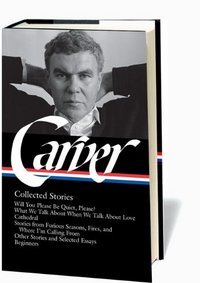

Purchase
Library of America
August 2009
On Sale: August 20, 2009
960 pages
ISBN: 1598530461
EAN: 9781598530469
Hardcover
Add to Wish List
Fiction Poetry
Raymond Carver’s spare dramas of loneliness, despair, and
troubled relationships breathed new life into the American
short story of the 1970s and ’80s. In collections such as
Will You Please Be Quiet, Please? and What We Talk About
When We Talk About Love, Carver wrote with unflinching
exactness about men and women enduring lives on the
knife-edge of poverty and other deprivations. Beneath his
pared-down surfaces run disturbing, violent undercurrents. Suggestive rather than explicit, and seeming all the more
powerful for what is left unsaid, Carver’s stories were held
up as exemplars of a new school in American fiction known as
minimalism or "dirty realism,” a movement whose wide
influence continues to this day. Carver’s stories were
brilliant in their detachment and use of the oblique,
ambiguous gesture, yet there were signs of a different sort
of sensibility at work. In books such as Cathedral and the
later tales included in the collected stories volume Where
I’m Calling From, Carver revealed himself to be a more
expansive writer than in the earlier published books,
displaying Chekhovian sympathies toward his characters and
relying less on elliptical effects. In gathering all of
Carver’s stories, including early sketches and posthumously
discovered works, The Library of America’s Collected Stories
provides a comprehensive overview of Carver’s career as we
have come to know it: the promise of Will You Please Be
Quiet, Please? and the breakthrough of What We Talk About,
on through the departures taken in Cathedral and the pathos
of the late stories. But it also prompts a fresh
consideration of Carver by presenting Beginners, an edition
of the manuscript of What We Talk About When We Talk About
Love that Carver submitted to Gordon Lish, his editor and a
crucial influence on his development. Lish’s editing was so
extensive that at one point Carver wrote him an anguished
letter asking him not to publish the book; now, for the
first time, readers can read both the manuscript and
published versions of the collection that established Carver
as a major American writer. Offering a fascinating window
into the complex, fraught relation between writer and
editor, Beginners expands our sense of Carver and is
essential reading for anyone who cares about his achievement.
Comments
No comments posted.
Registered users may leave comments.
Log in or register now!
| 


 © 2003-2025 off-the-edge.net
all rights reserved Privacy Policy
© 2003-2025 off-the-edge.net
all rights reserved Privacy Policy